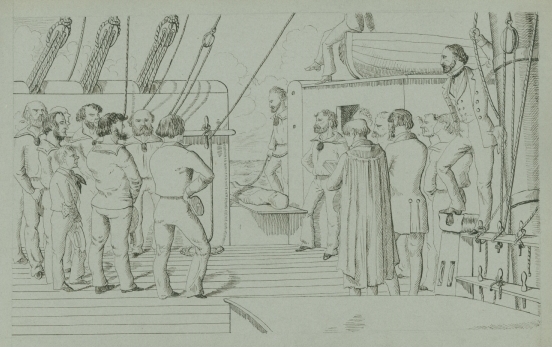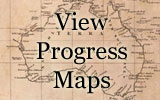On land
Things are looking up at the tiny settlement of Kingscote. We start the week with a wedding on board the John Pirie. Mary Ann Powell, who travelled as an emigrant in steerage with her two brothers and sister-in-law, marries one of the Pirie crew – William Staple, who intends to remain in South Australia. After the ceremony they all repair to the tents for dinner, music and dancing. Things liven up later, with ‘one or two amicable fights, amongst which the Bride and Groom were very conspicuous’, John Woodforde reports. But squabbles aside, the celebration seems to lift the general mood to everyone’s satisfaction.
Come Monday morning though, Samuel Stephens’ troubles return. His two officers are still largely absent. His second in command, Thomas Hudson Beare has not reported for duty, although his wife seems to be improving, and Mr Birdseye apparently only consents to turn up for a few hours in the middle of each day. A harassed Stephens is relying more and more on Henry Wallan, one of the original settlers, who begins to supervise the company men in building a store. When Mr Beare turns up on Wednesday 31st to resume his duties Stephens ignores him. And so it goes on. Some of the other recalcitrants have turned up again however. James and Joseph Jones seem to have tired of their strike and come to Stephens ‘begging that I would receive them again’. Strikes are all very well, but there is only one employer on this Island at the moment, and he has all the provisions as well!
And there is more good news. Captain Morgan reports at the end of the week that Mrs Beare is much better. Her children are able to return to her and she is able to acknowledge them. What a bewildering experience it all must have been for these children.
At sea
On the Africaine Mary Thomas is a little happier. She has made friends with the cabin cook who, in exchange for an extra glass of rum, will sometimes cook something for her. Mind you the fare does not sound very appetising – salt beef pie, rice pudding without eggs or milk and cake made with dripping. Still, beggars can’t be choosers and Mary is ever the optimist. She finds some aspects of shipboard life more difficult though. Earlier in the week she had her first experience of shipboard discipline, and found it brutal and distressing.
On the Buffalo progress is slow and George Stevenson continues his relentless critique of his employer, Governor Hindmarsh. There is no Sunday School again and Stevenson laments the lost opportunity to school the emigrant children. He also gives us an interesting insight into the uncomfortable conditions the poor steerage passengers must endure. The passengers are strictly segregated on deck and the only walking area accessible to steerage travellers is alongside the pig pens, which are ‘generally in a horrid state of dirt and uncleanness’. These injustices will ‘tell eventually’ he writes darkly.

This week is also a sad one on board the Buffalo. One of the sailors dies of consumption (tuberculosis). He is said to be ‘sensible to his latest hour, and spoke of his own death with the calmness and hope of a Christian.’ When he is buried later that evening, the shipmate who nursed him throughout ‘shewed by his sobbing and tears that a sailor can feel like a man’. It is a salutary occasion for all on board.
Language warning: Please note that these sources contain language which is today considered offensive. It has been retained as it is part of the historical record and evidence of past attitudes.


Just a quick note regarding this weeks edition, where there is an error in the spelling of the name of THOMAS Hudson Beare. ( Not, Charles Hudson Beare.)
Best regards, Neil.
Thanks, Neil. We’ve fixed that up.
Regards, Allison – History SA